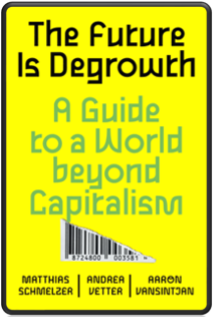
Over the course of 2023 my interest in climate advocacy has carried me deeper and deeper into the rabbit hole of climate change causes, which turn out to be the same forces driving a whole host of other ecological problems, culminating in one interconnected global crisis. That crisis is the product of consumer capitalism, with its relentless and singular pursuit of economic growth. This list features both diagnoses of the problem and a variety of proposed solutions.
In 1958, the economist John Kenneth Galbraith published a book called The Affluent Society, in which he argued that gross domestic product (GDP) was not a useful metric for gauging economic success. Because it was myopically focused on the production and sale of commodities, indifferent to their use or effects, and driven increasingly by artificial demand manufactured through advertising, GDP was likely to facilitate private sector profits while impoverishing public sector services and failing to address the most basic and vital of human needs for connection, community, and meaning. Galbraith was among the first–and certainly the most prominent–figures to suggest that nations would be wise to abandon the push for growth qua growth and replace it with something more directly indicative of human happiness.
Later, in 1972, a group of scholars associated with the Club of Rome published a volume called Limits to Growth, in which they argued even more emphatically that the dogged pursuit of ever-higher GDP was unsustainable in the long term. Further, it could be directly correlated to a series of damaging environmental impacts, such that continued extraction, production, and waste were certain to perpetuate continued and ever worsening environmental destruction. Concurring with Galbraith that the reigning economic model was conducive to inequality by way of glitzy consumer junk, these writers stressed that it was also toxic to those forms of wealth most important to–and most taken for granted by–human beings, like clean air, clean water, and a stable climate, to name a few.
Then, in 1989, Bill McKibben published The End of Nature, issuing the first long-form alarm about global warming for a general audience. McKibben, too, explained how consumer capitalism was burning through a wealth of natural resources while externalizing the effects into the world that people inhabit, with consequences discernible all the way into the global atmosphere. With characteristic care and clarity, he charted the problem in terms strikingly consistent with the scientific consensus today. If human beings did not change course abruptly, McKibben warned, the near and distant futures appeared alike increasingly bleak. There is a solemnity in his writing that recognized irreparable loss even then.
These books feature among an array of others, from George Perkins Marsh to John Muir to Rachel Carson to Al Gore, that have articulated versions of this concern all along. The economic metabolism of the “developed” world has, for at least eight decades now, generated economic growth by way of ecological destruction and labor exploitation, powering the process with fossil fuels, accumulating wealth in the hands of the few, and unloading the harms onto the impoverished many, primarily those in the “developing” world. It’s a problem with profound economic, ecological, and ethical dimensions, and it will shape every other important issue that we confront from now on. There’s simply no more putting it off.
The books on this list consider the problem in depth. All of them critique capitalism in one way or another, and most propose alternatives. Many of them advocate degrowth specifically, arguing that the future depends upon a controlled drawdown of economic activity designed to prevent environmental damage, reduce inequality, and facilitate the sustainable development of poor nations. Noting the obvious disappointments of consumer capitalism–the loneliness, the emptiness, the lack of fulfillment that invariably accompany the compulsive pursuit of more stuff–these authors argue that a simpler, more authentic, and more community-oriented lifestyle will not just create the conditions for sustainability, but will make us all happier and healthier along the way. There’s a lot to discuss here, but I’m hesitant to say much more because I have a pair of essays on the matter currently in-progress. For now it may suffice to say that changing economic behavior is very difficult to do, and the first step is understanding why a change is needed.
